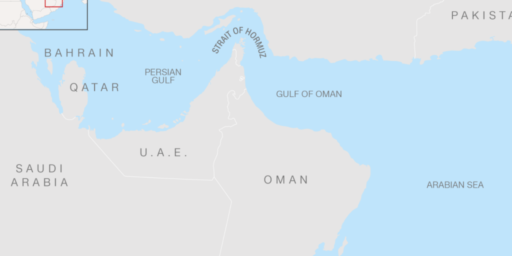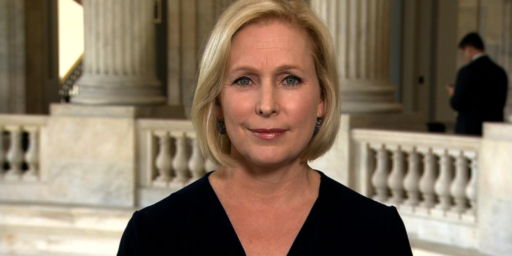International Relations Graduate School Pros and Cons
So, you want a career in foreign policy field and are weighing your options....
Andrew Exum and Erin Simpson, a brand-spanking-new PhD in war studies from the University of London and recentish PhD in government from Harvard, respectively, offer some advice to wannabe international relations* graduate students and generate thoughtful reactions from Dan Drezner (Stanford PhD, full professor at Tufts) and Robert Farley, (Washington PhD, assistant professor at Kentucky’s Patterson School). I commend all three posts to you in full.
Based on my own experience, I’d offer the following advice: It all depends on what you want to be when you grow up.
If you want to teach college from the day you finish school until the day you retire, the PhD or DPhil are all but required. There are simply too many of us floating around competing for jobs for hiring committees–who are comprised almost entirely of those with doctoral degrees–to even look at a candidate without one. Ideally, the degree should be from a traditional academic program rather than a public policy school. And the brand on the sheepskin matters; go to the highest ranked school you can get into and afford.
Indeed, I’d go a step further: Unless you’re going to be satisfied teaching at a lousy school, don’t bother pursuing a PhD if you can’t get into a top flight school–one ranked in the top 10; certainly, the top 25.
I had no idea what I was doing and applied only to the University of Alabama which, well, is not in the top25 IR PhD programs. I got an excellent education, left school with no debt, and have had a reasonably satisfying career. But, once I discovered that teaching at a school like the one where I finished my undergrad degree was actually not what I was cut out for, my academic employment options were quite limited.
If you want to be a think tanker, a PhD–preferably from a public policy school rather than an academic program– is preferable but an MA from a decent policy school can get you in the door. It’s very hard, though, to get the coveted senior fellowships and other jobs where you’re writing under your own byline and building a reputation as an intellectual without the PhD.
If you want to go into the Foreign Service, Intelligence community, or the Pentagon, a PhD is desirable but probably not worth the tradeoff in delayed earnings and entry into the workforce. As Farley points out,
[D]oing a Ph.D. rather than an MA means you’re four years closer to dead. This sounds trivial, but think of it this way; the four year difference between a 2 year MA and a 6 year Ph.D. constitutes roughly 10% of your entire expected professional career. If you’ve served in the military, or taken a couple years off, or worked another job, the math gets considerably worse. If you choose to pursue the Ph.D rather than the MA, here’s what you’re not going to do in those four years: Learn how government works from the inside, build a bevy of professional contacts within the bureaucracy, and (not least) make money.
Indeed, if I had it all to do over again, I’d probably have gotten a master’s degree from the best school I could get into and tried like hell to get a Presidential Management Fellowship. The PMF is the Golden Ticket in government service, shooting you all the way to the GS-13 level in a very short period and opening the path to the Senior Executive/Intelligence/Foreign Service as a relative kid. By comparison, it took David Petraeus 17 years to make lieutenant colonel (GS-13 equivalent) and 26 years to make brigadier general (the lowest SES equivalent). And he’s a West Pointer with a Princeton PhD!
Even without the PMF, a public policy masters will get you in the door and give you both the training and credentials to enable you to move up through the ranks expeditiously. Theoretically, the government doesn’t really care where you went to school–a degree from University of Phoenix is as good as one from Harvard to the personnel department. But a good brand name will matter later in your career.
Many government types actually manage to get a PhD in mid-career. (It’s especially common for military officers, since the Pentagon has a relationship with a handful of schools, most notably Princeton, that allows them to rush people through the program in a mere three years.) This comes with the twin benefits of the degree being paid for and being paid while in school.
Additionally, government service provides another route to being a think tanker or even a professor. While several of us at the director level at the think tank where I work have PhDs, most have MAs and very valuable experience at senior levels of government–ambassadors, assistant secretaries, National Security Council staffers, and such. And many of the elite universities around the country will hire people with that sort of experience as professors (especially in the public policy schools). The war colleges and other professional military education schools vastly prefer them to career academics.
As my own career path (Army officer, grad student, college professor, book editor, defense contractor, freelance writer, and think tanker) demonstrates, there can be many twists and turns in the road. The better your credentials and contacts, the better. Going to Harvard or Stanford or Chicago simply gives you more options than going to a less prestigious institution because it stands out on a resume. Additionally, as Farley notes, some schools do a much better job than others of providing institutional support in networking and finding jobs. And, of course, having spent your 20s working for the Deputy Secretary of Defense or the Ambassador to the United Kingdom is going to open more doors than having spent them in an archive somewhere working on a giant book few will ever read.
All that said, though, the Web has opened new pathways to recognition. Social networking sites like Twitter allow young people interested in public policy to, well, network with those much more senior and accomplished. (Indeed, this whole conversation started with some aspiring MA/PhD students asking questions of Exum and Simpson, resulting in a lively exchange and then these blog posts.) It’s easier than ever for smart people to find information and to publish their work and impress people.
Credentials still matter–probably more than they should and, especially, longer** than they should. But they likely matter less than they did a decade ago.
UPDATE: Steve Saideman (PhD, UC-San Diego, prof at McGill) weighs in.
_____________
*The discussion is much different for other fields; the expertise of those offering advice here is confined to this one.
**One of my pet peeves is that people continue to be judged on where they went to school years, even decades, down the road.







Dr. Joyner,
I am a fairly recent graduate from Troy’s MSIR program so I greatly appreciate this post. I am hoping to get into think tank or gov work here in DC. What level/type of positions should I be realistically looking to apply for? I ask because I have been applying for a while with little luck and it is starting to get frustrating. Any suggestions would be greatly appreciated.
@Trojan in DC: Sadly, a Troy MSIR is unlikely to get you in the door at think tanks. Not only is Troy not exactly a brand name school (I say that as someone who taught there for four years) but its MSIR was rendered a joke by years of University College running a degree mill (I say that as someone who helped turn the crank for two years). I understand things have turned around quite a bit in recent years but it is what it is. You may have some luck with some of the more ideological “think tanks” in town, of the sort who would hire someone from Regents.
You’ll get little such resistance from the Federal civil service. I haven’t really kept my eye on that venue for some years, but USAJOBS is the doorway for all that. I would think you’d be able to get in as a GS7 or even GS9 without all that much trouble–assuming no prior work experience–and get your foot in the door.
With the current fiscal climate, many agencies are imposing hiring freezes or have already instituted Reductions in Force (RIF). The Army is reducing 8000 billets overseas, so many of those displaced employees will be looking for work stateside, and they have priority. Get your USAJOBS resume done ASAP and pray for the best.
Did you find your experience teaching at Troy to be negative? I’m curious as to what the tradeoffs are between teaching at a lousy school or a not so lousy school. Is it a research versus teaching thing, a prestige thing, or are those jobs simply crummy?
Merit, anyone?
@Paul: Troy was a rather unusual institution for a whole lot of reasons. The academic leadership, from Provost to Dept Head, has changed for the better since my day and I understand things are much improved.
The problem with a school of that sort, even one that’s well run, is that the teaching load is very high, with an expectation of teaching a wide variety of courses far flung from one’s specialization. That promotes a high school mentality rather than one of expertise. That wouldn’t be too bad, actually, if they weren’t now also demanding–simply because they can–that professors nonetheless publish a significant amount of research.
Larger schools allow more specialization and tend to have better funding for professional development.
i’m an undergraduate (junior) at george washington university in dc. what is its reputation in govt/policy/academic circles? would you consider their grad school a good policy school with a good reputation to get into the foreign service/pentagon/intelligence community?
@Matthew: GW and Georgetown’s public policy masters programs are key feeders for the federal government.